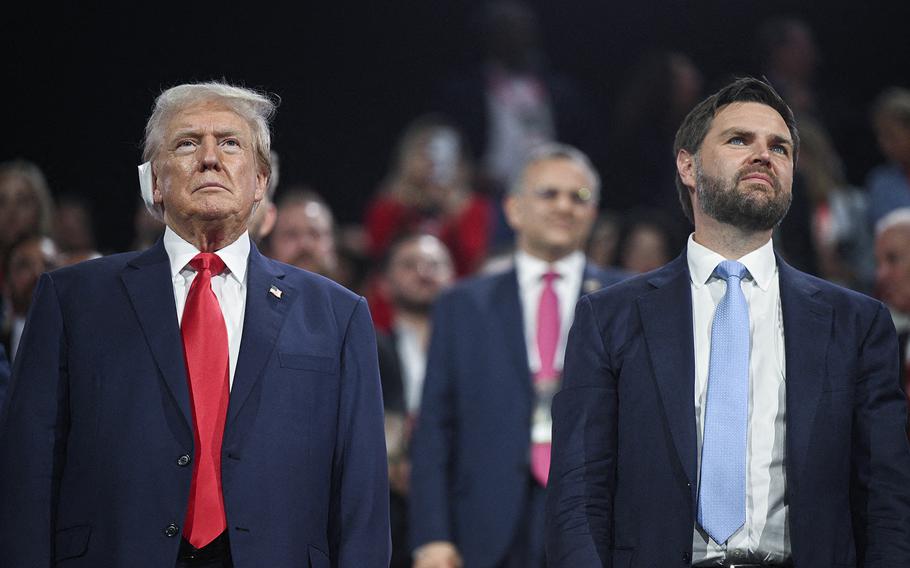Europe
Trump’s VP pick fuels European anxiety over US backing for Kyiv
Bloomberg News July 16, 2024

Former President and 2024 Republican presidential candidate Donald Trump, left, stands with U.S. Senator from Ohio and 2024 Republican vice president candidate J. D. Vance during the first day of the 2024 Republican National Convention at the Fiserv Forum in Milwaukee, July 15, 2024. (Brendan Smialowski/AFP/Getty Images/TNS)
(Tribune News Service) — When an outraged Ukrainian lawmaker berated JD Vance at this year’s Munich Security Conference over the Republicans’ blocking of aid to his country, the U.S. senator listened patiently. But Oleksiy Honcharenko couldn’t change his mind.
That task will now fall to European allies and Ukrainian politicians after former President Donald Trump picked Vance as his running mate in his election campaign, in a decisive break with the U.S. foreign policy old guard.
European officials said Vance’s nomination confirms their worst fears about the potential next Republican administration. It’s a sign they will have to do more to prove to the U.S. that it has interest in defending the continent through continued support for Kyiv.
Vance is “very smart, sly and cold-blooded,” Honcharenko told Bloomberg on Tuesday. But his nomination is a “very difficult scenario for us. He is very skeptical toward Ukraine and this war.”
That sense of alarm may be more widespread amid calls for U.S. President Joe Biden to withdraw his candidacy just months before the presidential election, compelling foreign partners to more seriously consider the prospect of a second Trump presidency.
During his first four years in office, the Republican president threated to wind down the U.S. contribution to NATO and hectored alliance members, especially Germany, for not spending enough on defense.
That was before the war in Ukraine, where U.S. military support has been crucial for Kyiv to stay in the fight. Vance has been a staunch critic of this approach. A recent Russian missile attack on a children’s hospital in Kyiv didn’t change his mind.
“It’s tragic and terrible,” Vance, who served with the U.S. military in Iraq, told Bloomberg on Monday. “It doesn’t change my underlying view that America doesn’t have the capacity and doesn’t have the interest to respond to every tragedy that exists in the world.”
Vance has also been very candid about his position on Ukraine in private meetings, according to a person with knowledge of the matter. He argued that the U.S. should spend aid money it gives Kyiv on schools and hospitals at home instead of those in Ukraine, the person said.
In an April op-ed for the New York Times, Vance characterized the war as unwinnable due to Russia’s large military-industrial capacity and the problems that Ukraine’s aging population present for further rounds of mobilization.
“A defensive strategy can work” for Ukraine, he said while making clear he opposed sending Patriot missile systems that enable the country to shoot down Russian missiles and drones.
“He takes an even more radical stance on Ukraine than Trump and wants to end military support,” said Nils Schmid, the foreign affairs spokesman for the ruling Social Democrats in German parliament. “Vance owes his entire political career to Trump and would also put personal loyalty to Trump above the constitution as vice president.”
While Vance’s criticism of expensive foreign entanglements shares much with U.S. isolationists, he isn’t opposed to them in principle. For him, China is the biggest threat to the U.S. and needs to be prioritized accordingly. “The thing that we need to prevent more than anything is a Chinese invasion of Taiwan,” he told the Heritage Foundation in April 2023.
That provides an opening for Europe to make its case to Vance, one senior official said. The message would need to be that dropping support for Ukraine would be seen as weakness in Beijing, said a diplomat with knowledge of the matter.
The bloc should try to convince him that China would see defeat for Ukraine as a sign of U.S. weakness, the official said. That could feed into Beijing’s calculations on Taiwan.
As for whether a U.S. pivot away from Europe would bear risks, Vance appeared skeptical, saying at the Munich Security Conference that he didn’t think Russian President Vladimir Putin represented an existential threat to Europe. To the extent that Putin did, he continued, Europe must foot the bill by itself to deter him.
Where that leaves European NATO allies is best seen in a testy exchange on X, the social media platform, with Polish Prime Minister Donald Tusk.
It’s a stance which echoes Trump’s own words in March that he would encourage Russia to “do whatever the hell they want” to NATO members who do not pay their fair share to the alliance. In Poland’s case, at least, the country has been NATO’s top spender and plans to commit 5% of economic output on defense next year.
If Trump wins, European leaders would have to learn anew to speak this transactional language, said EU diplomats.
With assistance from Alberto Nardelli, Silvia Killingsworth and Patrick Donahue.
©2024 Bloomberg L.P.
Visit bloomberg.com
Distributed by Tribune Content Agency, LLC.